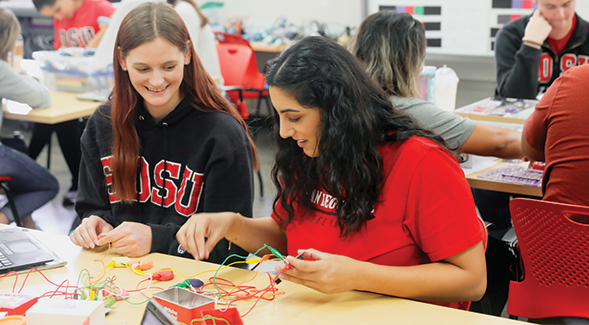Green Day Insights, AI Ethics and Culinary Identities: Academic Journeys Await SDSU Students
SDSU's fall catalog offers courses on a diverse range of thought-provoking topics and innovative courses.

This fall, San Diego State University students will reap leadership wisdom from a rock legend, discuss the ethics of artificial intelligence, delve into our country’s water issues, or learn about the role of food in Asian identities — SDSU’s intellectual exploits extend beyond textbooks.
For aspiring leaders, students enrolled in LEAD 205: Exploring Leadership will hear Green Day bass player Mike Dirnt share the meaning behind some of the band’s iconic songs.
“The idea is that the message or inspiration of the artist might be able to sink in for students and be the foundation for our discussion about personal and leadership development,” says Mike Donohue, a leadership coach and SDSU parent who pitched the course to Leadership Minor director Lisa Gates.
For those interested in exploring the virtual realm, there is an Artificial Intelligence and Ethics course that journeys into the effects AI is likely to have on the world.
“AI programs of different kinds can do things like write essays, computer code, and music; make financial predictions; recognize faces; and determine consumer preferences with startling accuracy. What are these programs? How will they likely affect the human social world? And, how can we ethically assess them and their use?,” reads the course description from SDSU lecturer Lorenzo Nericcio.
The following are additional fall courses on topical issues. Editor’s Note: Some courses may no longer be open, please check the schedule or department for information.
U.S. Water Policy (SUSTN 496), a new course, examines U.S. water issues and policy, focusing primarily on the Southwest region and with particular emphasis on California water policy, including the Mexico border region. will also use a stakeholder and case study approach, as well as do analysis work on water justice, access, international/border/US-Mexico perspectives, and Native American water rights/history/challenges/successes. (Professor James Murren)
________
Artificial Intelligence, Ethics, and Society
Students will draw on an interdisciplinary perspective, including philosophy, psychology, sociology, and just enough computer science to give us a working knowledge of the basics of these technologies. (Note that this is not a programming course.) In the course, Artificial Intelligence, Ethics, and Society (HONOR 313), students will be encouraged to reflect on the effects AI programs have on their own personal and social worlds, challenged to ethically evaluate the implementation of novel technologies, and assessed in their abilities to think critically about the intersection of human value and technological development. (Lecturer Lorenzo Nericcio)
________
What is Asian American food? Does it exist on its own, or only in relation to Asian and American cuisines? Eating Asian America (ASIAN 361) explores how Asian American food, much like Asian America itself, stands as a distinct entity, even as it is informed by Asian and American foodscapes and cultures. Delving into the intricacies of Asian American food will allow students to determine the important role that food plays in the formation and maintenance of Asian American communities, cultures, and identities. (Associate Professor Stephen Suh)
________
In Exploring Leadership (LEAD 205), students will explore the deeper meanings behind popular music and how that relates to one’s personal development comes to fruition. The course will offer students understanding, applying and critiquing leadership theories, examining personal strengths, values, goals, and philosophy of leadership. (Leadership Minor Director Lisa Gates and Associate Vice President and Dean of Students Randy Timm)
________
Turn those trendy dance moves into college credit. New this fall, K-pop Dance (DANCE 383) offers students the opportunity to observe how cultures use dance as a form of communication and expression. Students will learn about the evolution of K-pop since the 1980s, then will shift focus toward the K-pop fandom and its application on social media today. K-pop is composed of not just music but of its fandom, dancing, fashion, and makeup as well. (Associate Professor Chuyun Oh)
________
Contemporary Issues in Information Systems
This class goes beyond generative AI, which has been popularized by ChatGPT/transformer modeling. It includes discussions on various applications of AI, including natural language processing, perception, and robotics. Contemporary Issues in Information Systems (MIS 429) will show students how AI and robots can replicate the human brain to solve business problems. (Director, Associate Professor Aaron Elkins)
________
African American Music (AFRAS385) is an exploration of African American music from its African roots to present. Consideration of musical styles, events, significant contributors as well as role of sociocultural values in development of music. satisfies the ethnic studies [ES] requirement. (Lecturer Delores Fisher)
________
The course explores major social science literature of international Black urban experience. It looks at behavior, culture, and oppressions unique to the urban environment. Black Urban Experience (AFRAS421) satisfies the general education cultural diversity requirement. (Lecturer Mychal Odom)
________
Lecturer Mary Stout offers a brief study of sequential art from images in paleolithic cave paintings to medieval manuscripts, followed by in-depth study of the aesthetic, formal, and stylistic features of comics across cultures over the last century. Comics and History (HIST-157 and ECL-157) students will develop an appreciation of and a language for analyzing comics as an art form, and they will be able to contextualize these texts in terms of how they reflect the aesthetics and realities of a particular moment and how these reflections change over time. (Lecturer Mary Stout)
________
The course looks at the development of traditional values concerning the natural environment. It explores the reasons for altering values, in light of modern changes, in the relationship of human beings to the environment. Environmental Ethics (PHIL 332) students will look at the application of ethical principles to actions affecting the environment. (Professor Peter Atterton)
________
Women, Gender and the Environment
Women, Gender and the Environment (WMNST 530) is a comparative study of women's movements worldwide, including organizations, issues and initiatives. Women's diverse social/political strategies within local, national, and global contexts.
(Lecturer Christine Knott)



